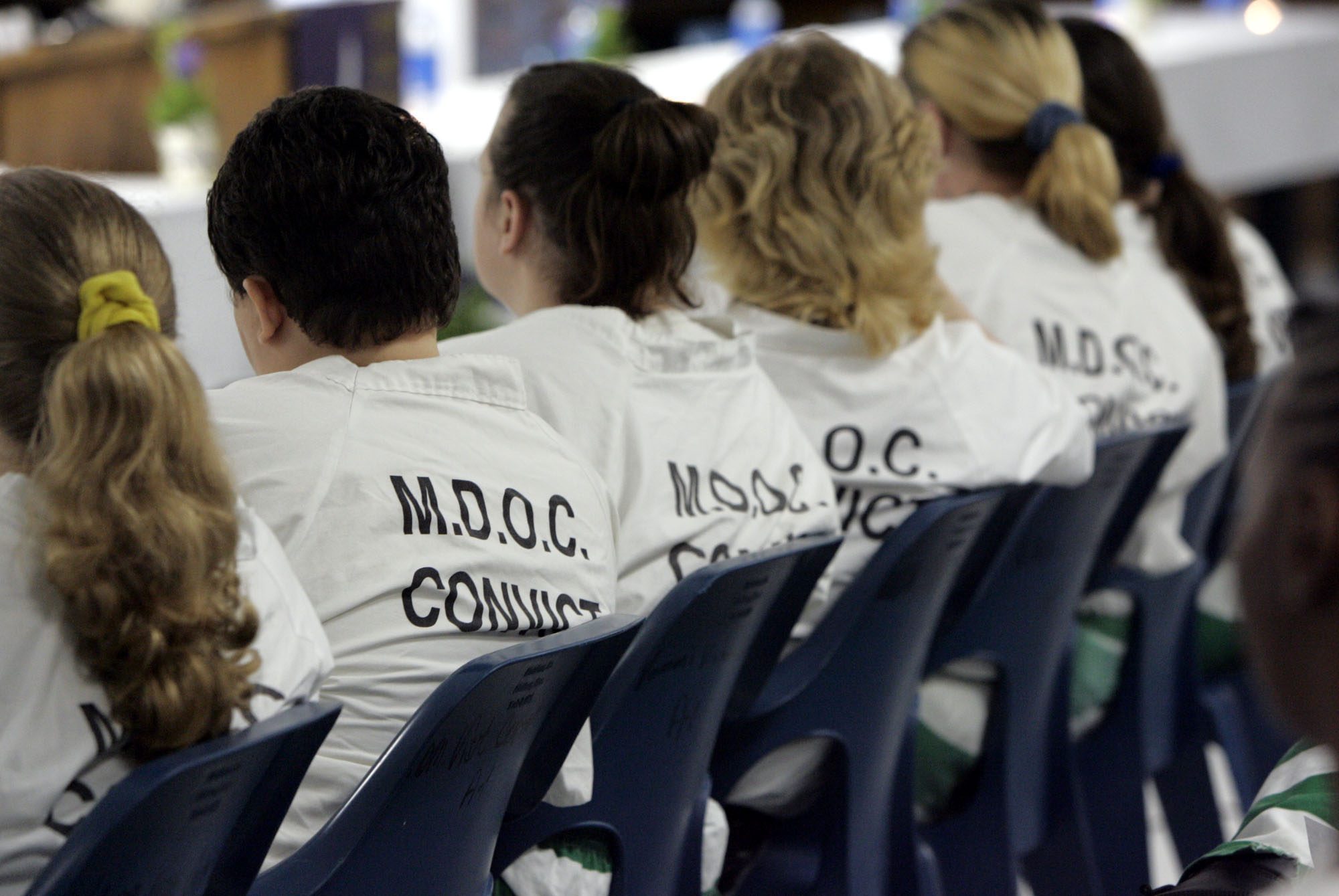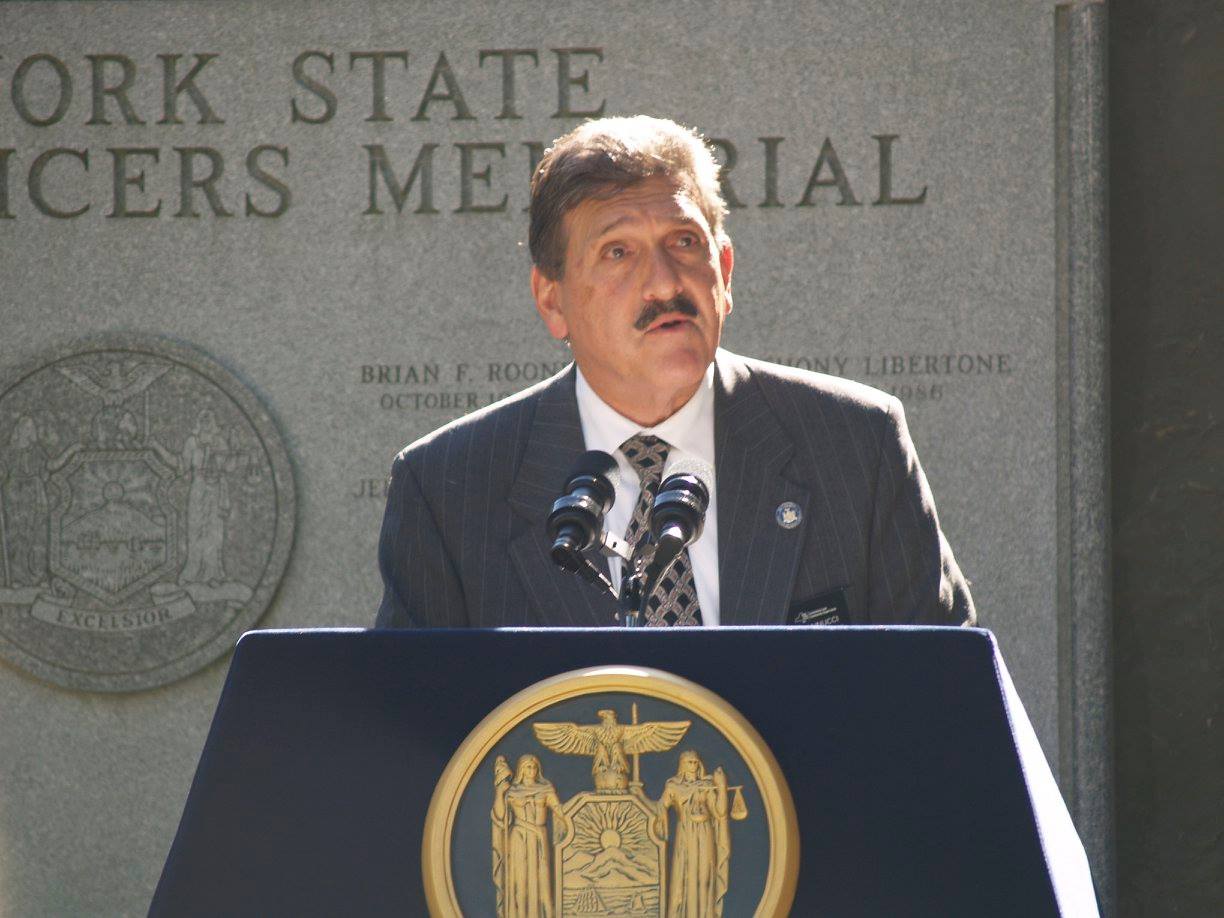Prisons Grow in Mississippi as State Officials Cut Parole
How Mississippi’s new parole board is helping expand the state prison system by dramatically cutting approvals and threatening the most frequent pathway out of prison.
Victoria Law | August 2, 2023


Loretta Pierre’s first five murder trials ended in mistrials. She was just 20 years old when she shot and killed an ex-boyfriend’s new girlfriend who had threatened her with a knife. For the sixth trial, Mississippi prosecutors got the judge to change the venue from her hometown of Gulfport to Vicksburg. Pierre felt confident after the series of mistrials, which included several hung juries and one in which the state’s medical examiner failed to appear. She had even assured her son she’d be going home when the latest trial ended. But her heart dropped in February 1989, the day before her son’s third birthday, when a Warren County jury convicted and sentenced her to life in prison.
Pierre says she was devastated but held on tightly to the possibility of someday getting out on parole—a chance that her sentence might not really condemn her to ultimately die behind bars.
“I felt like my life was over, but I knew, in the midst of all that, I would go up for parole in 1997,” Pierre told Bolts. “I was hopeful. I had seen so many women make parole their first time.”
More than a dozen rejections from the parole board and nearly two decades of attending perfunctory and fruitless hearings have eroded that confidence. Now 58, Pierre says she allowed herself to start hoping again in recent years, as Mississippi officials worked to expand parole and the state parole board began granting an increasing number of applications for release.
By October 2019, the parole board was approving roughly four out of every five people who applied for release. In 2021, one of Pierre’s friends at the Central Mississippi Correctional Facility (CMCF) who was also serving a life sentence was finally granted parole after 30 years in prison and 11 parole denials.
Then Mississippi parole rates started plummeting last year. The board, entirely revamped by appointments made by Governor Tate Reeves since he entered office in 2020, approved about 40 percent of people who were eligible throughout 2022. The board members have defended those lower release rates, accusing previous members of not reviewing cases thoroughly enough and promising increased scrutiny of applicants.
It’s unclear what scrutiny the parole board gave Pierre when she appeared before them in January 2022. She recalled that they asked standard questions during her minutes-long hearing—about her crime, the programs and classes she’d taken in prison, and her plans for release. Then, they denied Pierre’s application. It was her fourteenth rejection.
By effectively cutting the board’s approval rate in half, its new members threatened the most frequent pathway out of prison in Mississippi and helped trigger a rise in the state’s prison population after years of steady declines. While Mississippi’s incarceration rate consistently leads the country, reforms and greater use of parole had reduced its prison population from a height of about 22,500 in September 2013 down to 16,499 by the start of 2022.
Then last year, prison admissions started to outnumber releases as the board dialed back parole. Mississippi’s prison population grew nine percent between mid-2021 and the fall of 2022, one of only a handful of states that saw substantial growth in incarceration during that time period. As of July 16, 2023, the state imprisoned 19,252 people.
Some GOP lawmakers in Mississippi have joined local advocates in questioning the wisdom of reducing parole as the prison population again starts to rise and adds stress to an already overburdened system. A U.S. Department of Justice investigation last year determined that “gross understaffing” had contributed to deadly conditions. To avoid overcrowding, Mississippi officials scrambled to create hundreds of new prison beds, including re-opening the Delta Correctional Facility, a former men’s prison that the state had shuttered in 2012.
Pierre and hundreds of other women incarcerated at CMCF, which is just outside Jackson, where many of them have families, were shipped more than 100 miles to the newly-reopened prison in the state’s rural Delta region to make more space.
“I don’t ever want to give up hope,” Pierre told Bolts. “But sometimes hope can be your worst enemy.”
Mississippi established its parole board in 1972, composed of five governor-appointed members whose terms last “at the will and pleasure of the governor.”
Pierre and others convicted in the 1970s and 1980s became eligible for parole after serving at least a quarter of their prison sentences, or, for life sentences, at least ten years. (Pierre had been arrested in 1985, but officials counted her time in pretrial detention towards her prison term.) But then in 1995, the state dramatically restricted parole, requiring those with felony convictions to serve 85 percent of their sentence before becoming eligible. People sentenced to life after that had to spend at least 10 years in prison and also wait until they turned 65 before being allowed to petition a sentencing judge for a parole hearing; judges could then permit or dismiss the request for a hearing at their discretion. (The law was not retroactive and didn’t apply to Pierre.)
Under those new parole restrictions, Mississippi’s prison population nearly doubled from 12,292 in 1995 to more than 23,000 by the end of 2008.
But parole releases started to increase in 2009 after lawmakers allowed it for people convicted of nonviolent offenses and certain drug crimes after serving a quarter of their sentences. In 2014, Mississippi again expanded parole eligibility when then-Governor Phil Bryant signed House Bill 585, which restored the 25 percent time-served threshold for all offenses.
The 2014 law also created a process called presumptive parole for people with convictions for nonviolent offenses, in order to release them without a formal board hearing once they meet all conditions of their case plan, have no major violations in the past six months, and no objection from law enforcement or their victim.
Case plans for presumptive parole require the participation of the state prison system, the Mississippi Department of Corrections (MDOC). For anyone who could qualify for presumptive parole entering prison, a prison case manager is supposed to help them start creating a release plan within 90 days of their arrival, and inform the new arrivals of their parole eligibility date. The parole board can suggest changes but ultimately must approve the case plan.
Case managers are also supposed to meet with incarcerated people to review their progress at least once every eight weeks and send updates to the board every four months. In the months ahead of their first parole hearing, prison officials are also supposed to help people create a discharge plan, notify the board whether the person has completed it, and ultimately submit the plan to the board for approval. The parole board is then allowed to release people who follow that process without a formal hearing.
The first year the new law that included presumptive parole was enacted, parole releases in Mississippi nearly doubled, from 2,015 in 2013 to 3,906 in 2014.


By 2019, parole had become the principal way people were released from prison in Mississippi, with parole approvals making up 63.4 percent of all releases from prison. Reeves signed legislation in 2021 aimed at even further expansion. That year, the parole board held a monthly average of 870 hearings and granted parole to nearly three-quarters of applicants.
Some of these releases garnered outrage from both victims and lawmakers. In May, the decision to grant parole may have sparked one member’s resignation (the board remains short one member as of this writing).
Parole releases began a steep decline to a rate of about 40 percent in 2022. Jeffery Belk, a former Chevron manager who was appointed to chair the parole board at the start of the year, faced questions last November in a hearing with state lawmakers who were concerned by the growing prison population.
During his testimony to lawmakers, Belk pointed to a scathing 2021 audit of the board and its operations by a legislative watchdog agency, the Joint Committee on Performance Evaluation and Expenditure Review (PEER). The audit reported spotty attendance by members (auditors who reviewed hearings during one week in 2020 found none where all five members attended), shoddy documentation of parole decisions (the board stopped keeping minutes of hearings in 2009 when a new chairman took over) and unauthorized travel expenses (one was reimbursed more $20,000 in 2020 for commuting to work at the parole board offices in Jackson).
Belk, who didn’t respond to questions for this story, told the Mississippi Center for Investigative Reporting last year that the governor had tapped him to reform a board that he claimed was in “disarray.” Reeves has remade the board, replacing all five members since taking office, according to Mississippi Free Press. Julia Norman, who was formerly in charge of government affairs for the city of Meridian and whom Reeves appointed to the parole board last year, told lawmakers during her confirmation hearing this past February that members may deny parole if they feel the sentence approved by the judge on the case was too low.
“If it’s a violent crime and you got a short sentence, this parole board may like to see you finish that sentence off,” Norman said during the hearing. (Norman also didn’t respond to questions for this story.)
The PEER audit also concluded that “presumptive parole is not being implemented as required by the provisions of H.B. 585,” finding that in 2019 the board conducted at least 274 unnecessary hearings where the applicant already met all the criteria to qualify for release. When questioned by lawmakers last year about changes under the new parole board, Belk said he intended to “dramatically streamline the [presumptive parole] process.”
Mississippi state public defender André De Gruy told Bolts that MDOC officials never thoroughly implemented case plans for people becoming eligible for presumptive parole, in part because of broader turmoil and turnover in the prison system after then-Commissioner Christopher Epps resigned amid accusations of taking $1.4 million in bribes. (Epps was subsequently convicted and sentenced to 20 years in prison.)
“If they would implement case plans, it would relieve the burden on the number of cases the board has to review. If they’re not bogged down on hearings they don’t need to do, they can spend more time on each case and make better decisions,” De Gruy, who also serves on the state’s Corrections and Criminal Justice Oversight Task Force created by the 2014 reforms, told Bolts. “This doesn’t require a change in the law. It just requires them to implement the law that was passed nine years ago.”
A follow-up audit on the board that PEER released last month concluded the board still has not adopted an effective process for presumptive parole and continues to hold hearings for people who qualify for it. The board also still does not keep minutes for hearings.
Linda Ross was hopeful when she saw “presumptive parole” stamped on her paperwork the last time she went before the parole board in May 2022. In 1989, Ross was 27 and had been engaged in sex work when she says a man from whom she demanded payment attacked her. She fought back, strangling him to death. She pled guilty and was sentenced to life in prison. Her lawyer told her that she would be eligible for parole in 13 years.
In prison, Ross earned her high school equivalency and completed at least 25 educational, vocational, religious and therapeutic programs. She enrolled in college classes and earned 14 credits. But Ross and others with convictions for violent offenses don’t qualify for presumptive parole, regardless of whatever progress she’s made behind bars, even with those words stamped on her parole packet.
When Ross appeared before the board earlier last year, members rejected her application for release and told her to come back in three years, the maximum amount of time they can set before her case can be reconsidered. It was her seventh denial.
“I don’t see any justice in this system,” Ross told Bolts in a phone call from Delta. “They don’t look at your certification or programs or nothing like that.” Ross knows that her actions caused a man’s death, but also says she cannot undo the past. “I should’ve, would’ve, could’ve, but I can’t now.”
Overcrowding Mississippi prisons come with a steep cost, not just in terms of the trauma that reverberates from dangerous and understaffed facilities. This year, Mississippi lawmakers budgeted nearly $434 million on prison spending, an 11 percent increase from last year. One estimate predicts the state could spend up to $111 million more each year on prisons than it did in 2020 if the population behind bars continues to rise.
Overcrowding could eventually force the state’s hand. Under Mississippi’s Prison Overcrowding Emergency Act, officials must act to either reduce the number of people behind bars or expand the state’s carceral footprint if the prison population remains above 95 percent capacity for at least 30 days. The emergency act would also direct the state parole board to review people who are incarcerated for parole revocations and re-evaluating those who had previously been denied parole.
De Gruy, who has been working in Mississippi’s criminal legal system since the late 1980s, says he can’t remember any time a release has happened under that act, in part because, in previous decades, the state responded by opening new prisons.
He points to the most recent report by the Corrections and Criminal Justice Oversight Task Force, which showed that prison releases more than halved since 2019 while prison admissions remained roughly the same. “If the number of people making parole drops, then the prison population goes up. The same number of people are coming in and a lower number of people are going out. It’s that simple,” De Gruy told Bolts. “The dropping releases is what’s driving the prison numbers up and what’s keeping them up.”
The parole board could again be changing course. According to a follow-up report PEER released last month, parole release rates rose in the first three months of 2023 after last year’s nosedive, with an average of 63 percent of applicants approved for release during that period.
Still, the prison population has continued to rise, from 19,181 in January to 19,306 by July 1, nearing 88 percent of state prison capacity. The women’s prison population–currently hovering around 1,800—is the highest it’s ever been, a fact noted during the November legislative hearings.
To handle the increase, officials have converted CMCF into a largely men’s prison after re-opening the shuttered prison in the Delta region, where they transferred several hundred women late last year.


Pierre recalls how guards roused her and other women from sleep early one morning last December, ordering them to pack everything they owned before shackling their wrists and legs and loading them onto buses for transfer.
Pierre says she managed to pack all her belongings into seven bags, but only three made it to Delta. Instead of sharing an individual cell with one person as she did at CMCF, guards put her in a dorm-style pod with nearly four dozen other women, where she describes now living in “an orchestra of coughs, snorts and sneezes.” She says the previously mothballed prison didn’t seem prepared for the new arrivals, telling Bolts, “They didn’t have any clothes—no panties, no bras, no boxer shorts.”
Educational options were even slimmer at Delta. Pierre took numerous community college classes while at CMCF, earning 36 credits towards an associates degree, but says she has been bumped back to beginner coursework at Delta because it’s the only option. Pierre says incarcerated people help facilitate much of what programming remains available. At one point, according to Pierre, prison staff asked her to help with a parenting class behind bars, but she balked, saying she hasn’t lived with her son since he was a toddler. “How am I going to teach someone to parent from prison?” she said.
Pierre says she’s changed since in the nearly four decades since the confrontation that led to her imprisonment. She says she wouldn’t handle the situation the same way today and would try to flee instead of engaging with anyone threatening her. But that doesn’t seem to matter to the parole board. “Nobody’s the same person at twenty as they are at 58,” she reflected.
Pierre says she tries to keep up hope for a life after prison. She is continuing her college education and participates in Study and Struggle, a political education and mutual aid collective supporting incarcerated Mississippians, which will offer her a reentry stipend and a transition to part-time work if the parole board ever lets her out. “It’s hard to plan a future because I’m so uncertain about it,” Pierre said in a recent phone call from her new prison. “Every time I go up for parole, we [my family and I] can’t help but make plans. Then all of our hopes and plans get crushed. Repeatedly.”
Sometimes it feels like she has no future. “Some days, I lay here in my bed and pray to die because then it would all be over,” Pierre recalled telling her sister during a recent conversation, before hastily adding, “I would never do anything to hurt myself, but sometimes I ask the Lord to just take me in my sleep.”
Sign up and stay up-to-date
Support us
Bolts is a non-profit newsroom that relies on donations, and it takes resources to produce this work. If you appreciate our value, become a monthly donor or make a contribution.








